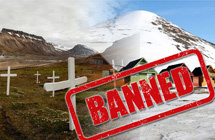盘点全世界最令人匪夷所思的禁令
|
Dying - Svalbard, Norway Pity the ill and elderly in the Norwegian archipelago of Svalbard where everyone is banned from dying due to the difficulty of burying bodies in the frozen ground - you must simply go elsewhere to end your days. The law was brought into place in 1950, after it was found that buried bodies were not rotting, according to YouTube account Half as Interesting. Due to the extremely cold weather in the region, it means bodies are unable to decompose.
This means that any diseases that the deceased has, could spread. The graveyard in the town holds a number of victims from 1918 who were killed by the Spanish flu, which killed over 100 million worldwide. Local newspaper Nieuwsblad reported that 11 bodies that had been buried in the town still had traces of the Spanish flu within them. Jan Christian Meyer from the Norwegian University of Science and Technology explained the death ban: 'The reason for this is that the permanently frozen ground will not only tend to keep your buried remains from decomposing and push them to the surface, it may also perfectly preserve the disease that killed you, for locals to pick up later. 'It is obviously not a punishable offence to die (after all, how would that be enforced?), but if you seem to be about to expire, every effort will be made to send you to the mainland. If you should die there anyway, you most certainly will not be buried there, because funerals don't work the way they are supposed to. 'You can apply to have your cremated remains put into the ground, but it requires state approval. In other words, death is not illegal as such, but it is banned from the area.' Black cars – Turkmenistan Trying to buy a new car in the central Asian country of Turkmenistan can be tricky business due to numerous restrictions imposed by President Gurbanguly Berdimuhamedov. Batir Turkmen, who is from Turkmenistan but lives in Dubai, explained: 'For the country with 60 degrees C in summer it is really strange and stupid - cars with black colours are banned, dirty cars are not allowed to drive in the city. BMW, Mercedes, etc - luxury cars have very high taxation and tuning cars and tires are not allowed.' He added: 'Cars which are older than five year are banned, cars with a right hand drive are banned, sports cars and two door cars are banned, cars engine bigger than 3.5 litres are banned and cars with tinted windows are banned.' Blowfish meat - Japan Puffer fish - also called blowfish or fugu in Japanese - are the world's most toxic group of fish and their livers, ovaries and skin contain tetrodotoxin, 100 times more lethal than cyanide. As such the emperor of Japan is forbidden to eat the delicacy for his own safety. Timothy Takemoto, who describes himself as a 'British guy in Japan' wrote on Quora: 'The emperor of Japan, but not the general population, is prohibited from eating the potentially highly poisonous blow-fish meat. 'Japanese citizens in general may eat blow-fish only when prepared by a qualified chef.' Vacuum cleaners - Victoria, Australia No one likes a noisy neighbour, but the state of Victoria in Australia has introduced a set of rules highlighting at what point during the day you can make noise, including dictating when you can vacuum. Sumit Gupta, Mumbai, India, said: 'In Melbourne, Australia, vacuuming your house between 10 pm and 7 am during weekdays and 10 pm and 9 am during the weekends is against the law.' Jogging - Burundi, East Africa What is a simple daily exercise to most people, could land you in jail in the east African country of Burundi - jog at your peril. Saiteja G R V, from Vellore, India, shared: 'Lying right across the infamous Rwanda, Burundi has a history of ethnic strife. During the prolonged period of turmoil that ended in the last decade, it was common practice for the citizens to go jogging together in groups, partly to have one another as protection from the militia. 'But in March 2014, Pierre Nkurunziza - the president of the country, banned jogging based on the argument that people use the activity as a cover to plan subversive activities.' Scrabble - Romania It's true that all manner of arguments can spring up during a heated game of word game Scrabble. But former Romanian President Nicolae Ceausescu was so opposed to the game he banned it entirely. Leo Peo, from Mumbai, India, shared on knowledge-sharing site, Quora: 'Now, we've all taken a Scrabble loss pretty seriously. It's one of the few games that reminds you of how stupid and illiterate you may well be. But in the 80s, Romanian President Nicolae Ceausescu went a little overboard and called for a ban. …He described it as "overly intellectual" and a "subversive evil".' |









